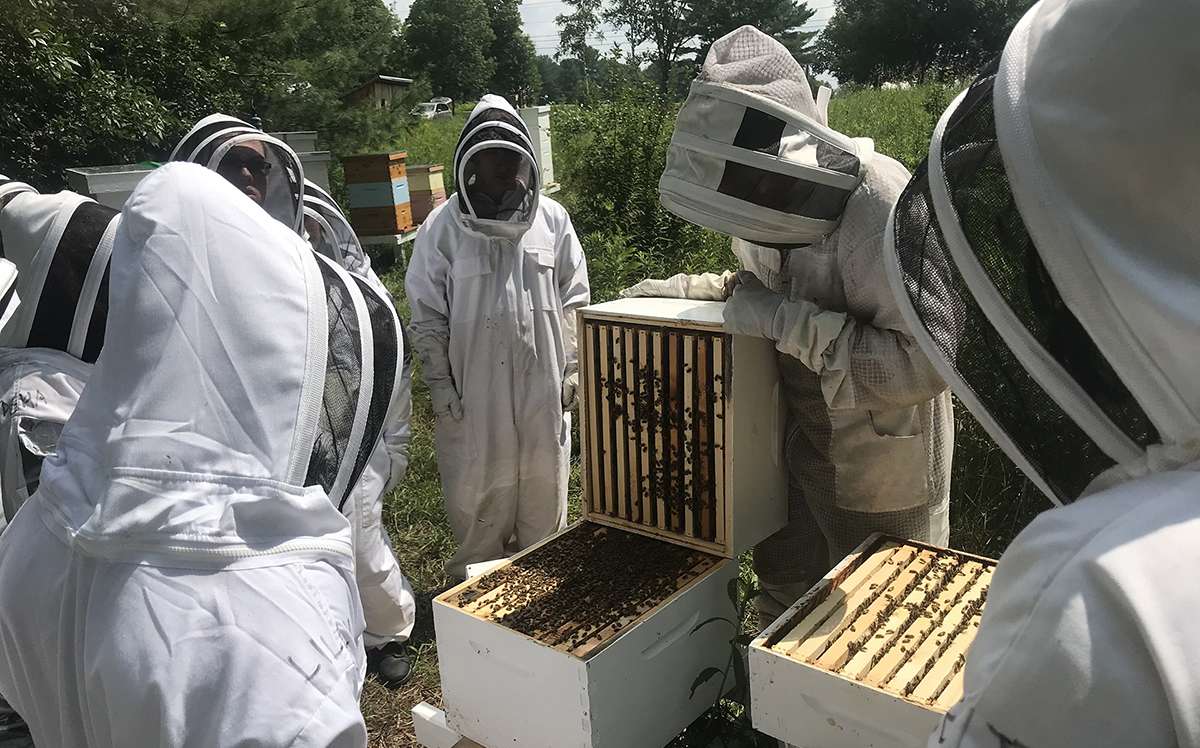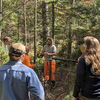
STEM salaries fueling growth: Innovative programs are positioning Maine students for careers
 Photo / Tim Greenway
Ares Bourque, a student at Southern Maine Community College, chose a STEM-based career because it melded his two interests of law enforcement and technology.
Photo / Tim Greenway
Ares Bourque, a student at Southern Maine Community College, chose a STEM-based career because it melded his two interests of law enforcement and technology.
There’s a lot of buzz lately about STEM jobs, and with good reason.
Turns out, science, technology, engineering, and math jobs typically pay better than others and are on the rise.
STEM jobs are projected to increase 10.5% from 2020 to 2030, while non-STEM occupations should see a gain of only 7.5%, according to the U.S. Bureau of Labor Statistics. And health care jobs, which typically require STEM training, are expected to see even more growth. Median annual wages for STEM jobs were nearly $50,000 above non-STEM wages in 2020. So, in this case, the buzz seems worthy.
Ares Bourque, a student at Southern Maine Community College, chose a STEM-based career because it melded his two interests of law enforcement and technology. Bourque, who grew up in Arundel, is majoring in cyber security, a field that boasts an average annual salary of $111,451 in Maine, according to Zip Recruiter.
Once he completes the two-year program, one of many STEM-focused associates degrees available through Maine’s community colleges and universities, he says he’d like to find an entry-level helpdesk or networking position, then eventually work up to a penetration tester or an ethical hacker.
“Cyber security is all about problem-solving,” Bourque says. “You have to think outside of the box and really put yourself in the mind of an attacker.”
Those working on educating Maine’s youth site problem-solving as one of many important skillsets developed in STEM training.

“As students study the STEM disciplines, they also develop important professional skills in communication, collaboration, and using evidence to develop solutions to complex problems,” says Susan McKay, University of Maine physics professor and director of the Maine Center for Research in STEM Education, or what’s known as the RiSE Center.
The STEM Partnership at the RiSE Center focuses on supporting STEM educators, and engages more than 1,000 PreK-12 and university educators across the state. The partnership, funded primarily by federal grants, with some contributions from school districts and private donors, received $1.35 million in February from the National Science Foundation for a program to engage students in coastal research projects to build data literacy and career competency in economically challenged coastal communities.
“Strong preparation in STEM keeps many career options open for Maine students, careers in problem solving and innovation that are often the launching point for new small Maine businesses,” says McKay.
Growing interest in STEM

Investing in STEM training for Maine’s youngest generations makes sense on many levels, says Ruth Kermish-Allen, executive director of the Maine Mathematics and Science Alliance, an Augusta nonprofit offering professional development for educators.
STEM education offers the type of hands-on experiential learning that kids love and can relate to in their own lives, which builds empowerment.
In addition, Maine’s natural-resources-based economies, from forestry to biological sciences, rely on STEM training, and educating the emerging workforce about all of the opportunities STEM careers offer will keep Maine competitive with its neighboring states, McKay says.
While Maine is a bit behind the curve in STEM training compared to some other parts of the country, it’s making up for lost time.
Northeastern University’s Roux Institute in Portland has a range of STEM programs and, with a $200 million in funding on which to build, is quickly expanding.
In the realm of lower and middle schools, the Maine Mathematics and Science Alliance received a $1 million grant from the Harold Alfond Foundation to expand computer science education. The three-year grant has a goal of training 100 elementary and middle school educators to give 10,000 rural students access to a foundational computer science education experience.
Programs like this one are critical in creating equity in Maine’s educational system, says Kermish-Allen, since many rural schools don’t have the tax base to include much in the way of STEM programing in their budgets.
Higher ed partnerships are leading to creative projects all over the state.
REV Up the Fun provides STEM activities to children through Maine Department of Education Summer Food Service Program sites across the state.

The STEM Sisters Initiative connects underrepresented students in Portland-area schools with female-identifying role models in STEM through teaching and mentorship. The program is led by Maine Campus Compact’s AmeriCorps’ Volunteers in Service to America STEM program. Started in 2014, the program includes a coalition of 17 member campuses that participate in a variety of projects throughout the year.
“To me, STEM education is important because having an understanding of basic scientific concepts encourages students to think more critically and fosters environments of wonder and curiosity,” says Amanda Whitten, a Maine-based STEM coordinator for AmeriCorps.
A bright future
Jobs for Maine Graduates launched its STEM initiative pilot program in 2021 in Franklin and Somerset counties. The project supports programs in science, technology, engineering and math for students in the Franklin and Somerset Counties’ School Districts, including career exploration opportunities, STEM camps, paid internships and scholarships for Maine community colleges and other higher education institutions in these counties.

With a focus on better preparing students exiting Maine high schools for jobs and careers, and encouraging education and training in the fast-growing clean energy sector, the program engaged 150 students in summer programming opportunities, and over 500 educators and 60 businesses and organizations in Franklin and Somerset counties in 2021, says Tracie Travers, Jobs for Maine Graduates’ vice president of workforce development. The program hopes to expand once more funding is secured.
With so many collaborative STEM projects in the works, Maine’s young people can expect to have a bright future in these fields, which could look even brighter if the state implements new policy recommendations released by the Maine State Chamber of Commerce, the Maine Mathematics and Science Alliance and Science is US in March. The recommendations aim to help bolster not only Maine’s STEM education, but also its workforce by recommending more inclusive thinking of Maine’s traditional industries as STEM jobs, creating industry-specific workforce development councils, and leveraging more funding for R&D and student loans for workforce training.
“A career in STEM offers so many interesting, challenging and important possible career paths,” says McKay. “STEM professionals are problem solvers, working to improve their communities and society in general.”










0 Comments